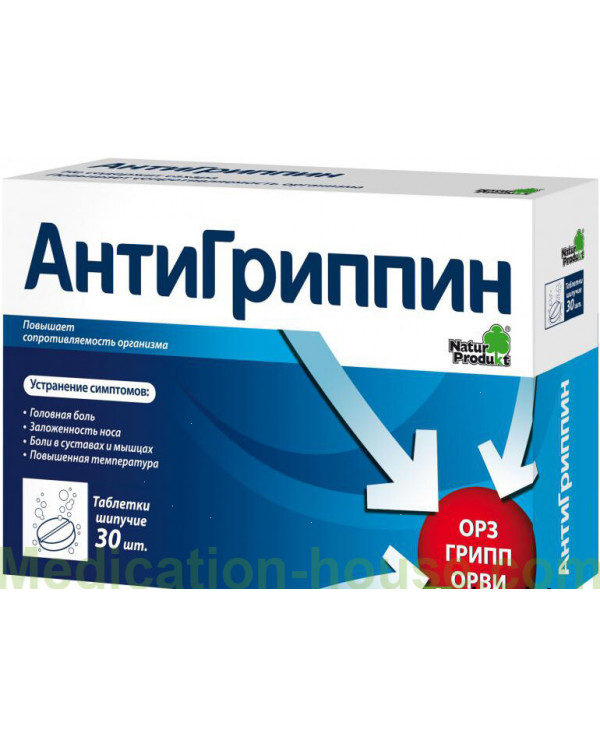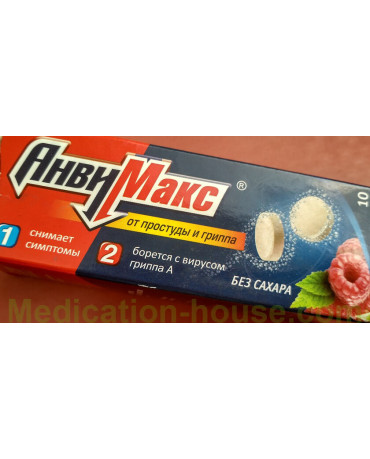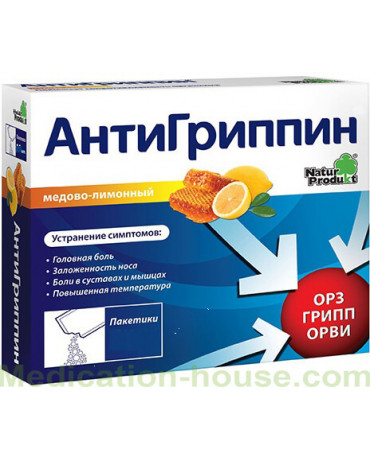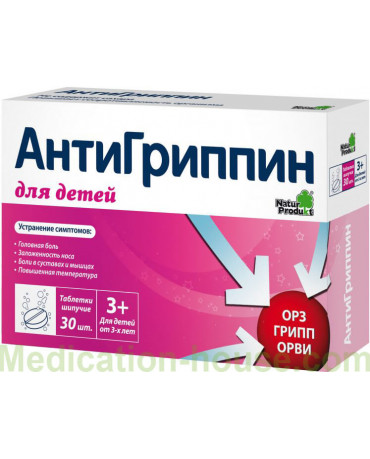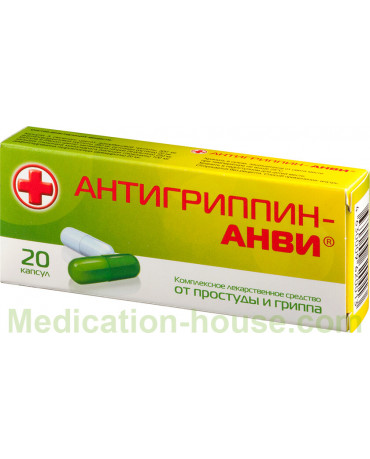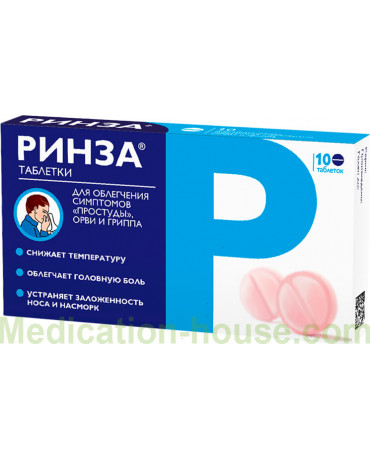Antigrippin tabs instruction
You can buy Antigrippin tablets on this page
Composition
Active substances:
paracetamol - 500.00 mg
chlorphenamine maleate - 10.00 mg
ascorbic acid - 200.00 mg
Excipients: sodium bicarbonate 826.40 mg, citric acid 950.40 mg, sorbitol 700.00 mg, povidone 25.00 mg, sodium saccharin 30.00 mg, sodium carbonate 93.00 mg, macrogol 70.00 mg, sodium lauryl sulfate 0.20 mg, lime flavor (Lime flavoring fruit additive) 95.00 mg.
Description
The tablets are round, flat, with a beveled edge and a dividing line on one side, white or almost white, with a barely noticeable marbling, with a fruity smell.
PHARMACOTHERAPEUTIC GROUP
A remedy for the symptoms of acute respiratory infections and colds (analgesic non-narcotic drug + vitamin + H1-histamine receptor blocker).
PHARMACOLOGICAL PROPERTIES
The combined drug.
Paracetamol has an analgesic and antipyretic effect; eliminates headache and other types of pain, reduces fever.
Ascorbic acid (vitamin C) is involved in the regulation of redox processes, carbohydrate metabolism, and increases the body's resistance.
Chlorphenamine - a blocker of H1-histamine receptors, has an antiallergic effect, facilitates breathing through the nose, reduces the feeling of nasal congestion, sneezing, lacrimation, itching and redness of the eyes.
Indications
Infectious and inflammatory diseases (ARVI, flu), accompanied by fever, chills, headache, pain in the joints and muscles, nasal congestion and pain in the throat and sinuses.
Contraindications
• Hypersensitivity to paracetamol, ascorbic acid, chlorphenamine or any other component of Antigrippin tablets;
• Erosive and ulcerative lesions of the gastrointestinal tract (in the acute phase);
• Severe renal and / or liver failure;
• Alcoholism;
• Angle-closure glaucoma;
• Phenylketonuria;
• Prostatic hyperplasia;
• Children's age (up to 15 years);
• Pregnancy and lactation;
With caution - renal and / or liver failure, glucose-6-phosphate dehydrogenase deficiency, congenital hyperbilirubinemia (Gilbert, Dubin-Johnson and Rotor syndromes), viral hepatitis, alcoholic hepatitis, advanced age.
DOSAGE AND ADMINISTRATION METHOD
Inside. Adults and children over 15 years of age, 1 tablet 2-3 times a day. The tablet should be completely dissolved in a glass (200 ml) of warm water (50-60 ° C) and drink the resulting solution immediately. It is better to take Antigrippin tablets between meals. The maximum daily dose is 3 tablets. The interval between doses of the drug should be at least 4 hours.
In patients with impaired liver or kidney function and in elderly patients, the interval between doses of Antigrippin tablets should be at least 8 hours.
The duration of admission without consulting a doctor is no more than 5 days when prescribed as an anesthetic and 3 days as an antipyretic.
Side effects
Antigrippin tablets is well tolerated in recommended doses.
In isolated cases, there are:
from the central nervous system: headache, feeling of tiredness;
from the gastrointestinal tract: nausea, pain in the epigastric region;
from the endocrine system: hypoglycemia (up to the development of coma);
from the hemopoietic organs: anemia, hemolytic anemia (especially for patients with a deficiency of glucose-6-phosphate dehydrogenase); extremely rarely - thrombocytopenia;
allergic reactions: skin rash, itching, urticaria, Quincke's edema;
other: hypervitaminosis, metabolic disorder, sensation of heat, dry mouth, paresis of accommodation, urinary retention, drowsiness.
All side effects of Antigrippin tablets should be reported to the doctor.
Overdose
Symptoms of an overdose of Antigrippin tablets are due to its constituent substances. The clinical picture of an acute overdose of paracetamol develops within 6-14 hours after its administration. Symptoms of a chronic overdose occur 2-4 days after an overdose.
Symptoms of acute paracetamol intoxication: diarrhea, decreased appetite, nausea and vomiting, abdominal discomfort and / or abdominal pain, increased sweating.
Symptoms of chlorphenamine intoxication: dizziness, agitation, sleep disturbances, depression, convulsions.
Treatment: symptomatic.
INTERACTION WITH OTHER MEDICINES
Ethanol enhances the sedative effect of antihistamines.
Antidepressants, antiparkinsonian drugs, antipsychotics (phenothiazine derivatives) - increase the risk of side effects (urinary retention, dry mouth, constipation). Glucocorticosteroids - increase the risk of developing glaucoma.
With simultaneous use, it reduces the chronotropic effect of isoprenaline.
Reduces the therapeutic effect of antipsychotic drugs (antipsychotics) - phenothiazine derivatives, tubular reabsorption of amphetamine and tricyclic antidepressants.
Inducers of microsomal oxidation in the liver (phenytoin, ethanol, barbiturates, rifampicin, phenylbutazone, tricyclic antidepressants) increase the production of hydroxylated active metabolites, which makes it possible to develop severe intoxications with small overdoses. Ethanol contributes to the development of acute pancreatitis.
Microsomal oxidation inhibitors (including cimetidine) reduce the risk of hepatotoxicity. The simultaneous administration of Antigrippin tablets and diflunisal increases the plasma concentration of paracetamol by 50%, and hepatotoxicity increases. The simultaneous use of barbiturates reduces the effectiveness of paracetamol, increases the excretion of ascorbic acid in the urine.
Paracetamol reduces the effectiveness of uricosuric drugs.
Special instructions
When taking metoclopramide, domperidone, or colestyramine, you should also consult your doctor.
With prolonged use in doses significantly higher than recommended, the likelihood of impaired liver and kidney function increases, and peripheral blood picture monitoring is necessary.
Paracetamol and ascorbic acid can distort laboratory tests (quantitative determination of glucose and uric acid in blood plasma, bilirubin, activity of “liver” transaminases, LDH).
In order to avoid toxic liver damage, paracetamol should not be combined with alcoholic beverages, and should also be taken by persons prone to chronic alcohol consumption. The risk of developing liver damage increases in patients with alcoholic hepatosis.
The administration of ascorbic acid to patients with rapidly proliferating and intensively metastatic tumors can aggravate the course of the process. In patients with a high iron content in the body, ascorbic acid should be used in minimal doses.
Terms of sell
You can buy Antigrippin tablets without a prescription.

